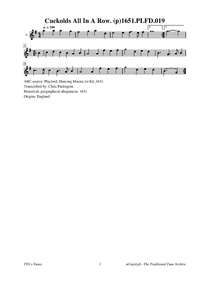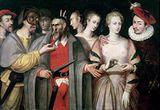Template:Pagina principale/Vetrina: Difference between revisions
No edit summary |
No edit summary |
||
| Line 7: | Line 7: | ||
|f_section=abc | |f_section=abc | ||
|f_played_by=[https://soundcloud.com/erasmustalbot-music Erasmus Talbot] | |f_played_by=[https://soundcloud.com/erasmustalbot-music Erasmus Talbot] | ||
|f_notes= | |f_notes=François Bunel, Actors of the Commedia Dell'Arte (c. 1590s). | ||
|f_caption= | |f_caption=As with many Playford country dance tunes, the melody was also saw service as vehicle for a ballad, registered in the Stationer's Register on June, 9, 1637, with words that are now lost but which began: "Not long ago, as all alone I lay upon my bed..." It was used as a party tune by the Cavaliers, according to Chappell (1859), who states that they sang the words of "Hey, boys, up go we" and "London's true character" to the tune. | ||
|f_source=[https://soundcloud.com/erasmustalbot-music/cuckolds-all-in-a-row Soundcloud] | |f_source=[https://soundcloud.com/erasmustalbot-music/cuckolds-all-in-a-row Soundcloud] | ||
|f_pix=420 | |f_pix=420 | ||
Revision as of 09:55, 4 June 2023

Played by: Erasmus Talbot
Source: Soundcloud
Image: François Bunel, Actors of the Commedia Dell'Arte (c. 1590s).

The latter song heaped abuse on the citizens of that town for siding against the King in the civil wars, and began "You coward-hearted citizens..."; it is printed in Rats rhimed to Death; or, The Rump Parliament hanged in the Shambles (1660) and in both editions of Loyal Songs written against the Rump Parliament. "Culcolds All a Row" is mentioned in the older song "O London in a fine town." Cuckoldry was frequently the topic of comic productions and ordinary jests in the early decades of the 17th century. Keith Whitlock ("John Playford's The English Dancing Master 1650/1 as Cultural Politics", Folk Music Journal, vol. 7, No. 5, 1999) suggests this stemmed from the annulment by King James VI/I of the marriage between the Earl of Essex and Lady Frances Howard, which resulted in a famous scandal and murder. The two principals were both barely out of puberty when they were wed in a political union, but quckly separated before the marriage could be consummated. Essex was sent abroad on an extended tour, and meanwhile Frances had found a new love in the 1st Earl of Somerset. When he returned they spurned one another, each decrying the incompatibility of the other; Frances's virginity was physically checked by committee, but a stand-in may have actually been examined. Sir Thomas Overbury, a close friend and advisor of Somerset, had tried to advise Somerset of the unsuitability of Frances, but the Howard family was anxious to see them wed, if only they could free her of her previous commitment to Essex. They were able to maneuver Overbury into disfavor with the King and he was imprisoned and then poisoned, allegedly by Frances and Somerset. This removed the last obstacle to Frances and Somerset and they were married, but the crime was revealed and the couple sent to the Tower of London. She was found guilty in a subsequent trail but spared execution, and was eventually pardoned by the King and released in early 1622. Cuckolds became the subject of ridicule in period broadside ballads and masquerades.
...more at: Cuckolds All in a Row - full Score(s) and Annotations
X: 1 T:Cuckolds All In A Row. (p)1651.PLFD.019 M:6/4 L:1/4 Q:3/4=100 S:Playford, Dancing Master,1st Ed.,1651. O:England H:1651. Z:Chris Partington. K:G V:1 clef=treble name="1." [V:1] a2 a a2 g|f2 g a2 d|e2 e f>ef|[1g6:|[2g3-g2| |:B|cdc BAB|A2 A fef|g2 d e d2|B3 G>AB| c>dc B>AB|A2 A fef|g2 d e d2|(B3G2):|
